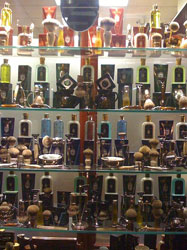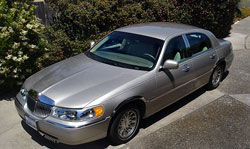Luxury goods firms taking the battle to Africa
A glut of oil‚ gas and mineral discoveries has swayed the continent's fortunes‚ giving rise to a band of super wealthy individuals with expensive tastes in countries such as Nigeria‚ Angola‚ Ghana‚ Mozambique and Kenya.

Between 2008 and 2013 sales of luxury goods in Africa grew by almost 35% in current value terms and is forecast to increase by a further 33% in the next five years‚ according to Euromonitor International. US based Bain's worldwide market study points to similar fervour for high-end trappings - total luxury goods revenue on the continent is expected to reach €2bn this year from €1.5bn in 2011.
Izaskun Bengoechea‚ a research manager at Euromonitor‚ says rising disposable incomes and increased availability are the key drivers of luxury goods in Africa.
"Although average disposable incomes are still lower than those in Westerns countries‚ large economic disparities and the emergence of large African companies has meant that there is an increasing elite of consumers with very high disposable incomes‚" she said.
In addition‚ partly thanks to international trends but also due to increasing visibility of these brands‚ African consumers are increasingly viewing luxury goods as a sign of status and success.
Companies such as Cartier‚ Louis Vuitton‚ Burberry‚ Gucci‚ Fendi and Salvatore Ferragamo have stores in Africa.
Africa - the new frontier
Bain partner Claudia D'Arpizio says with China's growth slowing‚ Africa is poised to have among the fastest-growing economies. Growth in China has cooled in the wake of a state crackdown on public officials' spending and corruption.
"Luxury sales are still very concentrated in South Africa and Morocco‚ but brands are starting to expand in new markets like Angola and Nigeria‚" D'Arpizio says.
Upmarket goods favoured by prosperous African consumers are not limited to watches‚ clothing‚ and handbags - spending lavishly on alcohol and fast cars is also on the rise. In Lagos's wealthiest district‚ Victoria Island‚ Ermenegildo Zegna opened a store this year on the same strip as Porsche‚ whose sturdy vehicles are de rigueur for the capital's pothole riddled roads. Ermenegildo Zegna makes made-to-measure suits for Hollywood stars Tom Cruise and Robert De Niro.
Two months earlier‚ Hugo Boss opened a store in the city‚ and Prada has confirmed plans to open in Angola‚ a vote of confidence in the oil-producing powerhouse. Sub-Saharan Africa is experiencing the second-fastest global economic growth - behind Asia-Pacific - and is home to five of the 10 fastest-growing economies in the world.
This includes Nigeria‚ which was the third-fastest growing market in the world for champagne between 2007 and last year. This impressive growth is forecast to increase by a further 78% in the five years. Total consumption reached 750 million bottles in 2012‚ higher than in Canada and the UAE‚ and placed Nigeria among the top 20 champagne markets in the world. Its cognac market is now bigger than Canada's.

"It may be hard to believe that a country where most of the people live on less than US$2 a day could be one of the fastest growing markets in the world for luxury goods‚ yet Nigeria‚ Africa's most populous country‚ is just such a place where the pursuit of wealth has even become a religion‚" Euromonitor luxury goods research head Fflur Roberts says.
With 60%‚ or about 71‚000‚ of Africa's millionaires in South Africa‚ the country has the continent's most developed luxury retail sector.
The growing number of wealthy individuals offers a compelling opportunity for proprietors of luxury brands seeking new markets‚ and more brands are likely to set up shop.
Shopping 'til you drop - at home
"Although many African consumers will visit international destinations for luxury shopping‚ the increasing availability of luxury goods also means that there is an increasing number of South Africans who do their high-end purchases at home...High income consumers from Angola often visit Cape Town for shopping and consumers from Mozambique‚ Zambia and other neighbouring countries stop in Johannesburg for luxury shopping‚" Bengoechea says.
Similarly‚ Kevin Lings‚ Stanlib's chief economist‚ says South Africa is seeing a "lot more tourism" that was boosting retail activity.
"Our tourism inflows‚ money wise are the highest ever recorded... this is supporting some of the retail activity‚ which is tending to be higher-end luxury shopping... so its specifically people arriving and shopping in Sandton City‚ Hyde Park or the V&A Waterfront‚" he says.
There are‚ however‚ challenges for luxury goods groups in the various African markets.
"Poverty remains widespread‚ infrastructure is weak‚ retail markets are undeveloped and brand awareness is lacking. Corruption can also be a problem‚ as can political instability in some countries‚" Roberts says.
The deluge of counterfeit luxury products also remains an issue.
Source: I-Net Bridge

For more than two decades, I-Net Bridge has been one of South Africa’s preferred electronic providers of innovative solutions, data of the highest calibre, reliable platforms and excellent supporting systems. Our products include workstations, web applications and data feeds packaged with in-depth news and powerful analytical tools empowering clients to make meaningful decisions.
We pride ourselves on our wide variety of in-house skills, encompassing multiple platforms and applications. These skills enable us to not only function as a first class facility, but also design, implement and support all our client needs at a level that confirms I-Net Bridge a leader in its field.
Go to: http://www.inet.co.za





















